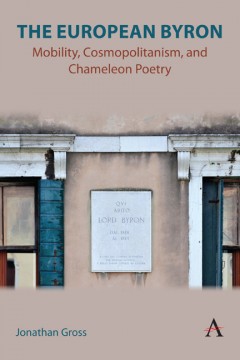The European Byron
Mobility, Cosmopolitanism, and Chameleon Poetry
By Jonathan Gross
Other Formats Available:
- About This Book
- Reviews
- Author Information
- Series
- Table of Contents
- Links
- Podcasts
About This Book
Byron concealed himself in various literary disguises, a process he called “mobility.” In this study of influences on Byron’s verse and Byron’s European impact, I explore these borrowings and transformations as they manifested themselves in his reading. At issue is the very concept of romantic poetic voice. Framing himself in the tradition of the Irish yet cosmopolitan Thomas Moore, Byron adopted continental guises, imitating both Italian writers and political heroes, such as Dante, Machiavelli, and Tasso. In establishing an Italian identity, Byron relied upon the Italian writers he translated (Pulci, Dante), Thomas Moore’s “Fudge Family in Paris,” and Shelley’s “Julian and Maddalo,” as well as Goethe’s Faust. This Europeanization of Byron should not conceal the fact that Byron adopted poses from his predecessors, such as Walter Scott, in order to fashion himself as a Scottish poet who also happened to be English. Byron became the writers he read: Moore, Shelley, Wordsworth, Scott, Foscolo, Lady Morgan, and Madame de Stael. Those who imitated Byron, particularly Alexander Pushkin and Adam Mickiewicz, often read him in French translations, but became acute interpreters of his literary example. They explained how the European Byron was created in the nineteenthcentury, and what it meant to be a Harold in Muscovite Cloak, or a Polish Byron, or any national reincarnation of this complex, chameleon poet.
By borrowing from a wide eighteenth-century field, Byron showed how reading could become writing, fulfilling, for Pushkin and Mickiewicz, a mobile and chameleon definition of the epic, as a novel in verse or product of digressions and improvisations. As Peter Thorslev has shown, the Byronic hero was stitched together from works by Monbron, Radcliffe, Beckford, and other writers. I begin by examining Thomas Moore, whose Irish Melodies were a key influence on Hebrew Melodies, and whose Fudge Family in Paris helped shape the tone and style of Byron’s Don Juan. Byron’s conversations with Madame de Stael encouraged him to “Stick to the East,” and he followed her example during his years in England. By examining the manuscripts and marginalia of Byron, the author shows the key influence of William Beckford, Robert Southey, and Isaac Disraeli on the construction of “Vision of Judgment”; of John Moore’s Zeluco, Madame de Stael’s Corinne, UgoFoscolo’s Last Letters of Jacopo Ortis, and Lady Morgan’s Italy on Childe Harold I-II, Hebrew Melodies, and Childe Harold IV, and Don Juan.
In “The Ironic Mode in Politics,” the author considers Byron’s support for the Greek Revolution, which he cast in cynical terms. His political/poetic example led Pushkin to enlist and Adam Mickiewicz as well, the latter of whom died in Istanbul. The museums that honor them present narratives of Byron’s European impact, particularly his legacy in political liberalism. The book thus concludes by considering how scholarship on Alexander Pushkin’s Eugene Oneg in transformed the epic into a novel in verse. Adam Mickiewicz's translation of "The Giaour" and his improvisations, which impressed Pushkin, draw on Byron’s digressive style. Their epics, Eugene Oneg in and Pan Tadeusz, show the legacy of Byron’s poetic influence and his political support for freedom of speech.
Reviews
Author Information
Series
Anthem Studies in Global English Literatures
Table of Contents
Links
Stay Updated
Information
Latest Tweets



